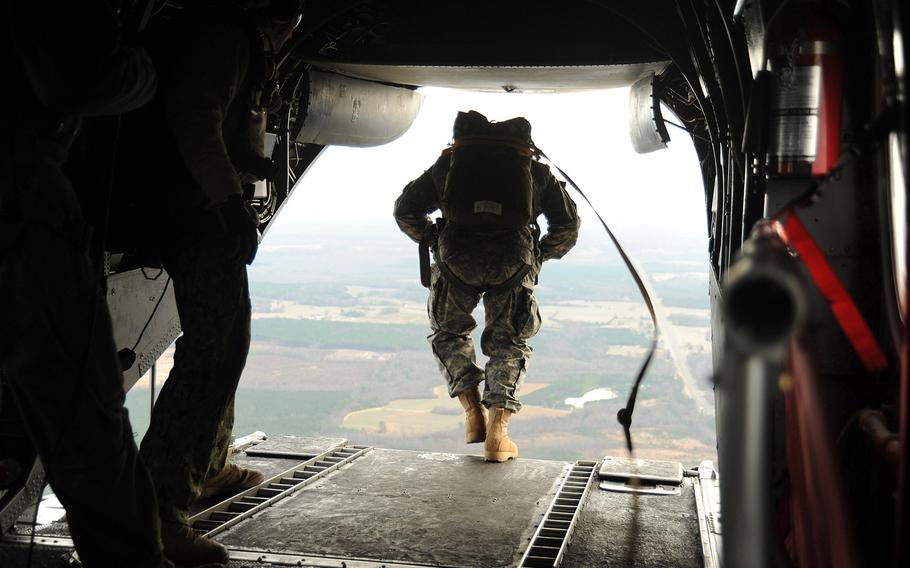
U.S. Navy SEALs jump from a CH-46E Sea Knight helicopter during training near Fort Pickett on Dec. 20, 2011. (Meranda Keller/U.S. Navy)
A commander overseeing U.S. special operations troops battling the Islamic State in Iraq has ordered a SEAL platoon to return to San Diego early after a “perceived deterioration of good order and discipline,” the military said late Wednesday.
The commander of the Special Operations Joint Task Force-Operation Inherent Resolve made the order, U.S. Special Operations Command said in a statement.
“The Commander lost confidence in the team’s ability to accomplish the mission,” the statement said.
Two defense officials with knowledge of the issue told the Washington Post that SEALs had been drinking alcohol in violation of General Order No. 1. The officials spoke on the condition of anonymity due to the sensitivity of the issue.
The unit, which one of the officials said is part of SEAL Team 7, was under investigation, both defense officials said. It’s not clear whether they could face criminal charges or administrative punishment, the Post reported.
Commanders had already made efforts to mitigate the operational impact of the redeployment, SOCOM said.
U.S.-backed Iraqi security forces and other paramilitary groups are in the midst of an operation, dubbed “Will of Victory,” to clear remnants of ISIS from an area north of Baghdad and surrounding areas in the Diyala, Salahuddin and Anbar provinces.
Iraq declared victory against ISIS in July 2017, but the terrorist group has transformed into an insurgency that continues to conduct deadly attacks in the country.
Increased scrutinyThe apparent breakdown in discipline within the elite Navy team, which the statement said occurred “during non-operational periods,” comes in the wake of the court-martial of SEAL Chief Petty Officer Edward Gallagher, who was acquitted of murder charges in the 2017 killing of a wounded Islamic State captive under his care in Iraq.
The military jury also cleared Gallagher of attempted murder in the shootings of two civilians, and all other charges, except for posing for photos with the body of the dead captive.
The trial was one of the Navy’s most high-profile war crimes cases and had drawn support for Gallagher from President Donald Trump and dozens of Republican lawmakers.
It was one of several cases in recent months that have drawn scrutiny on the special operations communities that have borne the strain of a high operational tempo over more than 17 years of war in the Middle East.
In June, former Green Beret Maj. Matthew Golsteyn pleaded not guilty in a military court to allegations that he wrongfully killed an unarmed Afghan man in Helmand province almost a decade ago.
Also in recent months, two U.S. special operations troops pleaded guilty for their parts in the June 2017 fatal strangulation of Green Beret Staff Sgt. Logan Melgar in Mali.
As part of arrangements with military prosecutors, a Navy SEAL Team 6 member and a Marine Raider both agreed to testify against two others — Navy SEAL Chief Petty Officer Tony DeDolph and Marine Raider Gunnery Sgt. Mario Madera-Rodriguez — who face several charges, including murder, for Melgar’s death.
Drug-use allegationsThe announced redeployment from Iraq comes just days after Military Times reported that it had obtained an internal Navy investigation that found several SEAL Team 10 members busted for cocaine use in May 2018 had snorted the substance or spiked alcohol cocktails with it and cheated drug tests to avoid getting caught.
The recent incidents were part of a trend of misconduct within the special operations command, which in December prompted Gen. Tony Thomas, the SOCOM boss at the time, to launch an internal review throughout the command.
SOCOM’s statement on Wednesday offered few details about what occurred in Iraq to raise the commander’s concern there.
“All Department of Defense personnel are expected to uphold proven standards and to comply with laws and regulations,” the statement said. “Alleged violations are thoroughly investigated.”
garland.chad@stripes.com Twitter: @chadgarland